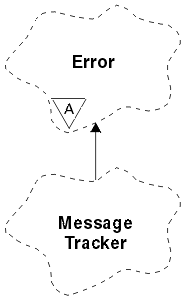Figure 16. ImqMessageTracker class

This class encapsulates those attributes of an ImqMessage or ImqQueue
object that can be associated with either object. It relates to the MQI
calls listed in Table 17.
ImqBinary (see ImqBinary)
ImqError (see ImqError)
ImqMessage (see ImqMessage)
ImqQueue (see ImqQueue)
- accounting token
- A binary value (MQBYTE32) of length MQ_ACCOUNTING_TOKEN_LENGTH. The
initial value is MQACT_NONE.
- correlation id
- A binary value (MQBYTE24) of length MQ_CORREL_ID_LENGTH assigned by the
user for the purpose of correlating messages. The initial value is
MQCI_NONE. The additional value, MQCI_NEW_SESSION, is
possible.
- feedback
- Feedback information to be sent with a message. The initial value
is MQFB_NONE. The following additional values are possible:
MQFB_SYSTEM_FIRST
MQFB_SYSTEM_LAST
MQFB_APPL_FIRST
MQFB_APPL_LAST
MQFB_COA
MQFB_COD
MQFB_EXPIRATION
MQFB_PAN
MQFB_NAN
MQFB_QUIT
MQFB_DATA_LENGTH_ZERO
MQFB_DATA_LENGTH_NEGATIVE
MQFB_DATA_LENGTH_TOO_BIG
MQFB_BUFFER_OVERFLOW
MQFB_LENGTH_OFF_BY_ONE
MQFB_IIH_ERROR
MQFB_NOT_AUTHORIZED_FOR_IMS
MQFB_IMS_ERROR
MQFB_IMS_FIRST
MQFB_IMS_LAST
MQFB_CICS_APPL_ABENDED
MQFB_CICS_APPL_NOT_STARTED
MQFB_CICS_BRIDGE_FAILURE
MQFB_CICS_CCSID_ERROR
MQFB_CICS_CIH_ERROR
MQFB_CICS_COMMAREA_ERROR
MQFB_CICS_CORREL_ID_ERROR
MQFB_CICS_DLQ_ERROR
MQFB_CICS_ENCODING_ERROR
MQFB_CICS_INTERNAL_ERROR
MQFB_CICS_NOT_AUTHORIZED
MQFB_CICS_UOW_BACKED_OUT
MQFB_CICS_UOW_ERROR
You can also use an application-specific string of your choice. For
more information about this, see the Feedback field of the message
descriptor (MQMD) in the WebSphere MQ Application
Programming Reference book.
- group id
- A binary value (MQBYTE24) of length MQ_GROUP_ID_LENGTH unique within a
queue. The initial value is MQGI_NONE.
- message id
- A binary value (MQBYTE24) of length MQ_MSG_ID_LENGTH unique within a
queue. The initial value is MQMI_NONE.
- ImqMessageTracker( );
- The default constructor.
- ImqMessageTracker( const ImqMessageTracker &
tracker );
- The copy constructor. See the operator = method for
details.
- void operator = ( const ImqMessageTracker &
tracker );
- Instance data is copied from tracker, replacing the existing
instance data.
- ImqBinary accountingToken( ) const ;
- Returns a copy of the accounting token.
- ImqBoolean setAccountingToken( const ImqBinary &
token );
- Sets the accounting token. The data length of
token must be either zero or MQ_ACCOUNTING_TOKEN_LENGTH. This
method returns TRUE if successful.
- void setAccountingToken( const MQBYTE32
token = 0 );
- Sets the accounting token. token may be zero,
which is the same as specifying MQACT_NONE. If token is
nonzero, then it must address MQ_ACCOUNTING_TOKEN_LENGTH bytes of binary
data. When using predefined values such as MQACT_NONE, it may be
necessary to make a cast to ensure a signature match; for example,
(MQBYTE *)MQACT_NONE.
- ImqBinary correlationId( ) const ;
- Returns a copy of the correlation id.
- ImqBoolean setCorrelationId( const ImqBinary &
token );
- Sets the correlation id. The data length of
token must be either zero or MQ_CORREL_ID_LENGTH. This method
returns TRUE if successful.
- void setCorrelationId( const MQBYTE24 id =
0 );
- Sets the correlation id. id may be zero, which
is the same as specifying MQCI_NONE. If id is nonzero, then it
must address MQ_CORREL_ID_LENGTH bytes of binary data. When using
predefined values such as MQCI_NONE, it may be necessary to make a cast to
ensure a signature match; for example, (MQBYTE *)MQCI_NONE.
- MQLONG feedback( ) const ;
- Returns the feedback.
- void setFeedback( const MQLONG feedback
);
- Sets the feedback.
- ImqBinary groupId( ) const ;
- Returns a copy of the group id.
- ImqBoolean setGroupId( const ImqBinary &
token );
- Sets the group id. The data length of
token must be either zero or MQ_GROUP_ID_LENGTH. This method
returns TRUE if successful.
- void setGroupId( const MQBYTE24 id = 0
);
- Sets the group id. id may be zero, which is the
same as specifying MQGI_NONE. If id is nonzero, it must
address MQ_GROUP_ID_LENGTH bytes of binary data. When using predefined
values such as MQGI_NONE, it may be necessary to make a cast to ensure a
signature match, for example (MQBYTE *)MQGI_NONE.
- ImqBinary messageId( ) const ;
- Returns a copy of the message id.
- ImqBoolean setMessageId( const ImqBinary &
token );
- Sets the message id. The data length of
token must be either zero or MQ_MSG_ID_LENGTH. This method
returns TRUE if successful.
- void setMessageId( const MQBYTE24 id = 0
);
- Sets the message id. id may be zero, which is
the same as specifying MQMI_NONE. If id is nonzero, it must
address MQ_MSG_ID_LENGTH bytes of binary data. When using predefined
values such as MQMI_NONE, it may be necessary to make a cast to ensure a
signature match, for example (MQBYTE *)MQMI_NONE.
MQRC_BINARY_DATA_LENGTH_ERROR
© IBM Corporation 2001. All Rights Reserved

